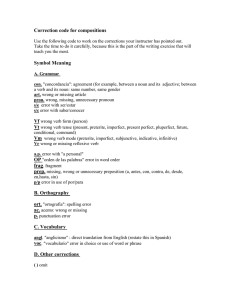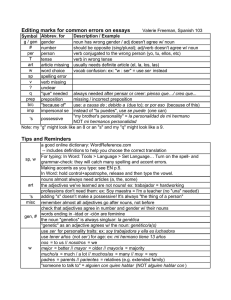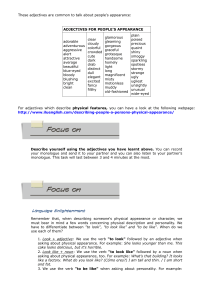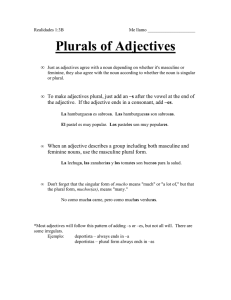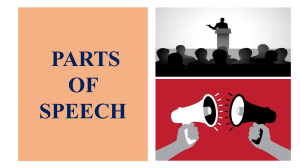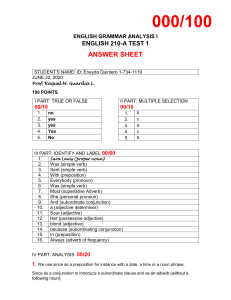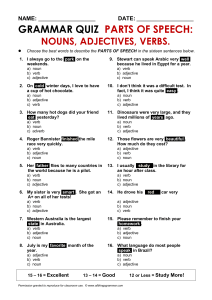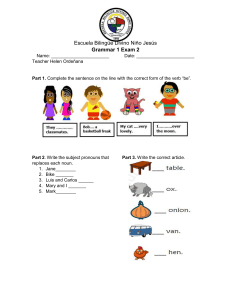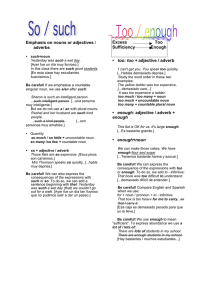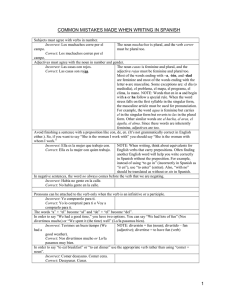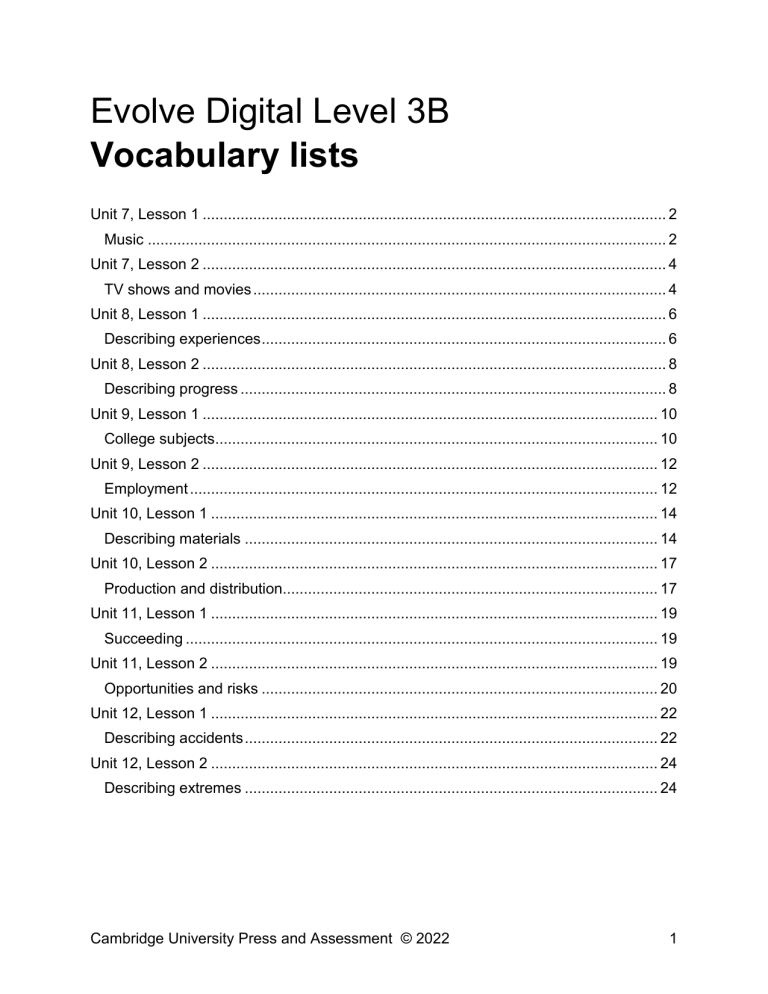
Evolve Digital Level 3B Vocabulary lists Unit 7, Lesson 1 .............................................................................................................. 2 Music ........................................................................................................................... 2 Unit 7, Lesson 2 .............................................................................................................. 4 TV shows and movies .................................................................................................. 4 Unit 8, Lesson 1 .............................................................................................................. 6 Describing experiences ................................................................................................ 6 Unit 8, Lesson 2 .............................................................................................................. 8 Describing progress ..................................................................................................... 8 Unit 9, Lesson 1 ............................................................................................................ 10 College subjects......................................................................................................... 10 Unit 9, Lesson 2 ............................................................................................................ 12 Employment ............................................................................................................... 12 Unit 10, Lesson 1 .......................................................................................................... 14 Describing materials .................................................................................................. 14 Unit 10, Lesson 2 .......................................................................................................... 17 Production and distribution......................................................................................... 17 Unit 11, Lesson 1 .......................................................................................................... 19 Succeeding ................................................................................................................ 19 Unit 11, Lesson 2 .......................................................................................................... 19 Opportunities and risks .............................................................................................. 20 Unit 12, Lesson 1 .......................................................................................................... 22 Describing accidents .................................................................................................. 22 Unit 12, Lesson 2 .......................................................................................................... 24 Describing extremes .................................................................................................. 24 Cambridge University Press and Assessment © 2022 1 Unit 7, Lesson 1 Music classical (music) (noun) – serious music by people like Mozart and Stravinsky “Sometimes I listen to classical music while I study. I find it relaxing." country (music) (noun) – a style of popular music from the southern and western US “My cousin in Nashville, Tennessee is a big fan of country music." EDM (noun) – electronic dance music; a type of dance music with a strong beat, usually played at clubs and festivals “My friends love EDM. They go to a dance club every weekend." folk (music) (noun) – music written and played in a traditional style “There were some folk musicians playing in the park. They played traditional songs they learned from their families over many years.” heavy metal (noun) – a type of very loud, distorted rock music played on electric instruments “My roommate plays heavy metal all day. I hate it! It's so loud." hip-hop (noun) – a type of popular music in which the words are spoken rather than sung “My favorite kind of music is hip-hop. I like the mix of rap with other modern styles. It makes me want to dance.” jazz (noun) – music with a strong beat that is often played without written music “We went to a live jazz show last weekend. It's amazing how they play without using written music.” pop (noun) – modern music with a strong beat which is popular with young people “My younger cousins always like the latest pop songs that you hear on the radio.” reggae (noun) – a type of popular music from Jamaica with a strong beat “We saw a lot of reggae performances when we were in Jamaica." Cambridge University Press and Assessment © 2022 2 rock (noun) – a type of popular music with a strong beat, often played with electric guitars and drums “My friends and I want to start a rock band. I can play electric guitar, Jim plays the drums, and Max plays bass. We just need a singer!” Cambridge University Press and Assessment © 2022 3 Unit 7, Lesson 2 TV shows and movies animated movie (noun) – a film in which drawings and models seem to move “I took my niece to see the new animated movie. It was about a fish who got lost and had to find his way home. We both loved it.” comedy (noun) – entertainment such as a movie, play, etc. that is funny “My roommates and I like to watch comedies. We like to watch movies that make us laugh." documentary (noun) – a movie or television program that gives facts about a real situation or real people “My uncle is making a documentary about different parts of the world that many people don’t know about." drama (noun) – a serious movie or television show with realistic characters “My roommate was watching a TV drama all day yesterday. She loves them, but I prefer to watch things which are very different to real life.” game show (noun) – a program on television in which people play games to try to win prizes “‘Wheel of Fortune’ is an American game show where people try to guess a phrase while seeing only a few of the letters. The player spins a wheel and wins money.” horror movie (noun) – a film or story that entertains people by shocking or frightening them “My best friend and I love horror movies. We love movies that make us really scared.” science fiction (noun) – stories about life in the future or in other parts of the universe “My boyfriend loves science fiction, especially anything about spaceships and life in the future.” musical (noun) – a play or movie in which part of the story is sung to music “My son just got the lead part in his high school musical. He’s a great singer, and dancer. I can’t wait to see it.” Cambridge University Press and Assessment © 2022 4 reality show (noun) – a television show about ordinary people who are filmed in real situations “I'm watching a great new reality show. It follows three students from Europe who all go to study in India for a year. It’s really fun." romantic comedy (noun) – a movie or television program about love that is intended to make you laugh “My husband and I love watching romantic comedies. He likes comedies and I like romance, so they are perfect for us to watch together." soap opera (noun) – a series of television programs that continues over a long period and is about the lives of a group of characters “My favorite soap opera is on tonight. In this episode, one of the characters is going to find out that her husband has been lying to her." talk show (noun) – a television show or radio program where people are asked questions about themselves and their lives “I like to watch talk shows at night. I like it when the hosts interview celebrities." thriller (noun) – a book or movie with an exciting story, often about crime “I was at Frank’s place yesterday, and he started watching a thriller about a detective that had to solve a huge crime." Cambridge University Press and Assessment © 2022 5 Unit 8, Lesson 1 Describing experiences achievement (noun) – success in doing something well, usually by working hard “Graduating from college was my greatest achievement.” challenge (noun) – something that is difficult and that tests someone’s ability “I recently ran 30 miles across a mountain trail. I wasn't sure I could do it; I had to train very hard. It was a real challenge.” change (noun) – a situation in which something becomes different, or the result of something becoming different “Moving to Paris has been a big change. The culture and language are very different from my country.” chore (noun) – a piece of work that is often boring or unpleasant but needs to be done regularly “I have a lot of chores to do this weekend. I need to clean the kitchen, and then do some laundry and tidy my room.” job (noun) – a piece of work that you have to do “We're organizing our garage this weekend. It's going to be a big job.” opportunity (noun) – an occasion or situation that makes it possible to do something that you want to do “My university has a program in London. It’s a great opportunity to spend a year in another country.” process (noun) – a series of actions that you take in order to achieve a result “Replacing the CPU in my laptop was a complicated process. But I watched some videos on YouTube, and I learned how to do it.” project (noun) – a carefully planned piece of work that has a particular purpose “We were given a school project last week. For homework, we had to try to make a robot.” success (noun) – the achievement of results that were wanted or hoped for Cambridge University Press and Assessment © 2022 6 “Our café opening was a big success! We had a lot of customers on our first day, and we made a lot of money.” Cambridge University Press and Assessment © 2022 7 Unit 8, Lesson 2 Describing progress concentrate on (verb) – to use most of your time and effort to do something “I came to the library so that I can concentrate on studying. It's too noisy at home.” do your best (verb phrase) – to try as hard as you can to do something A: Where are you? Are you going to make it for the meeting? B: I'm doing my best, but the weather is terrible. I'm trying to find a cab now. have a chance (verb phrase) – to have the opportunity or the time to do something “I'm sorry, I have nobody to take care of the baby today, so I haven't had a chance to finish the report yet.” have problems with (verb phrase) – to have difficulty with something “I'm having problems with this website. I am trying to register for an online course, but it's not showing me the options that I need to choose.” have time (verb phrase) – to have enough time to do something “We have lots of time to check in and go through security. The flight doesn't leave for another two hours.” take it easy (verb phrase) – to relax and not use too much energy “I have a lot of work to do for the event tomorrow. So today I just want to take it easy and read a book and relax." get nowhere (verb phrase) – to not make any progress or achieve anything “I'm trying to build this dresser but I'm getting nowhere. I keep making mistakes and having to start over." have trouble with (verb phrase) – to have difficulty with something “I'm having trouble with this jar. It won't open!" make good progress (verb phrase) – to get closer to achieving or completing something, often sooner than expected or with few problems Cambridge University Press and Assessment © 2022 8 “We're making good progress on the house. It's almost finished. When we started, we thought it would be finished in September, but now it's going to be finished in July, two months early." save time (verb phrase) – to reduce the time spent or required to do something “I have too much work to do today. I ordered takeout for lunch to save time." spend time (verb phrase) – to use time doing something or being somewhere “I've been spending a lot of time learning to play the guitar. I practice at least two hours each day." waste time (verb phrase) – to spend time doing something that is unnecessary or unhelpful “We had the wrong address in the GPS, so we wasted a lot of time driving in the wrong direction." Cambridge University Press and Assessment © 2022 9 Unit 9, Lesson 1 College subjects architecture (noun) – the job or activity of designing buildings “I'm studying architecture in college. I'd like to design ‘green’ buildings that conserve energy." biology (noun) – the scientific study of living things such as plants, animals, and the human body “I'd like to study biology like my sister. She studies mice and other small mammals." business (noun) – the buying and selling of goods and services “I studied business in college, which helped me learn how businesses become successful. I now work for a big corporation in the city." chemistry (noun) – the scientific study of substances (for example: oxygen, hydrogen, and carbon) and how they react or combine “In chemistry you learn about elements. Hydrogen and helium are the most common elements in the universe." computer science (noun) – the study of computers and how they can be used “I'm going to study computer science in college. I want to learn how to be a programmer for one of the big tech companies after I graduate." physics (noun) – the scientific study of natural forces, such as energy, heat, and light. “A basic law of physics is that every action has an equal and opposite reaction." economics (noun) – the study of the impact of money on people, companies, and countries “I'm going to study economics. I want to learn about the stock market and things like that." education (noun) – the process of teaching or learning in a school “I studied education in college, and now I teach in an elementary school." engineering (noun) – designing, building, and repairing things such as machines, bridges, roads, and buildings Cambridge University Press and Assessment © 2022 10 “I studied engineering in college. I am currently working on a project to build a bridge in the city center." law (noun) – the system of official rules in a country “I'd like to study law so I can become a lawyer or a judge." medicine (noun) – the study of treatment for illness or injury “I'm studying medicine so I can become a doctor and help sick people." political science (noun) – the study of politicians, power, and government “I'm studying political science because I'm interested in how political leaders make decisions. Cambridge University Press and Assessment © 2022 11 Unit 9, Lesson 2 Employment apply (verb) – to ask officially for something, often by writing “I applied for a job at an architecture firm. I hope they call me for an interview!" career (noun) – a job that you do for a long period of your life “The university organized a job fair last week. It was an event where we met with people from different companies to help us decide what career we want after we graduate." contract (noun) – a legal agreement between two people or organizations, especially one that involves doing work for an amount of money “I have a contract with a small tech company. I'm designing their website. I've agreed to finish it by May 1st, and they will pay me $500." employer (noun) – a person or company that pays people to work for them “Before the job interview, I looked up some information about the company and the person interviewing me. It's always good to learn about your future employer." fire (verb) – to remove someone from their job, usually because they have done something wrong or badly “The manager fired Jason. He was always late, and he didn't do much work when he was in the office. Now Jason has to find a new job." hire (verb) – to employ someone or pay someone to do a job “I had a great interview with the manager, and he hired me right away! I'm so excited to start working there." manage (verb) – to control or organize someone or something “I was spending too much money, so now, every month I'll look at how much money I spent and make a plan for the next month. It'll help me manage my finances." profession (noun) – a type of work that needs special training or education “Teaching is an important profession. You must complete proper education and training to become a teacher." Cambridge University Press and Assessment © 2022 12 retirement (noun) – the act of leaving your job and stopping working, usually because you are old “My parents saved enough money for retirement, so that when they were 65, they were able to stop working. Now they do things they enjoy, like gardening." salary (noun) – a fixed amount of money that you receive from your employer, usually every month “Your starting salary will be $45,000 per year minus taxes. You'll be paid on the last day of every month." wage (noun) – the amount of money a person regularly receives for a job, usually on an hourly or daily basis “I get paid an hourly wage at the factory. The company has a machine that all the employees use to record what time they start and finish work." working hours (noun) – the amount of time someone spends at work during a day A: Oh, it's almost 5:00. Do you need to leave? B: Not yet. My working hours are 9:30 to 5:30. Cambridge University Press and Assessment © 2022 13 Unit 10, Lesson 1 Describing materials light (adjective) – not heavy “The boxes were really light, so I was able to carry them all up the stairs to my apartment at the same time." artificial (adjective) – made by people “I bought some artificial flowers for the dining room. They look nice, and we won't have to water them." fragile (adjective) – easily damaged, broken, or destroyed “I am sending my mom a vase for her birthday. It is very fragile. So, I have to be careful to wrap it carefully, so it doesn't break on the way." hard (adjective) – not easy to bend, cut, or break “Some materials, like steel or diamond, are very hard. They can be difficult to cut or to bend into a different shape." heavy (adjective) – weighing a lot “This sofa is really heavy. Even with two people carrying it, it still weighed a lot." natural (adjective) – something that exists or happens because of nature, not because it was made or done by people “We visited some natural hot springs in Japan." soft (adjective) – not hard, and easy to press “I love the feeling of soft towels fresh from the laundry." strong (adjective) – a strong object does not break easily or can support heavy things “Brick is a popular material for houses because it is very strong. You can build things on top of it, like the roof of a building, and it lasts for many years and doesn't get damaged easily." warm (adjective) – having a temperature between cool and hot “After we finished the hike, we had a hot drink and lit a fire to keep warm." Cambridge University Press and Assessment © 2022 14 waterproof (adjective) – waterproof material or clothing does not let water through “These boots are waterproof. I can wear them in the rain and my feet won't get wet." cotton (noun) – cloth or thread that is made from the cotton plant (a plant that makes a soft, white substance) “I prefer to wear cotton T-shirts. They feel nice and soft." glass (noun) – a hard, transparent substance that objects such as windows and bottles are made of “My uncle works in a factory that makes glass bottles." leather (noun) – the skin of animals that is used to make things such as shoes and bags “I like wearing leather boots. They're comfortable and they last a long time." metal (noun) – a usually hard, shiny material such as iron, gold, or silver “I work in a metal works factory. We make steel pipes and steel beams for buildings." plastic (noun) – a light, artificial substance that can be made into different shapes when it is soft and is used in a lot of different ways “Plastic should be recycled when possible. It's not good for the environment." polyester (noun) – a type of artificial cloth used for making clothes “Many clothes that look like cotton are actually polyester, which can be made from plastic." stone (noun) – a hard, natural substance that is found in the ground “Stone walls are very strong and have a beautiful look." wood (noun) – a hard material that trees are made of “My father makes beautiful wood furniture. He gets the wood from a nearby forest.” wool (noun) – thick thread or material that is made from the hair of a sheep or other animal “I love to wear a wool hat and scarf in the winter. They keep me warm." Cambridge University Press and Assessment © 2022 15 Cambridge University Press and Assessment © 2022 16 Unit 10, Lesson 2 Production and distribution catch (verb) – to find and stop an animal that is trying to escape “All of the fish at this restaurant were caught by local fishermen." design (verb) – to draw or plan something before making it “Our company designs clothes. Our designs are sent to a factory that makes the clothes." export (verb) – to send goods to another country in order to sell them there “The US exports many products such as food, machines, and automobile parts to other countries." freeze (verb) – If something freezes or is frozen, it becomes hard and solid because it is very cold. “You can freeze fresh fish so you can keep it for many months." manufacture (verb) to make something, usually in large numbers in a factory “My car was manufactured in the US. But some of the parts were made in other countries." ship (verb) – to send something from one place to another “The books are being shipped from China. They will be here in two weeks." store (verb) – to put something in a safe place until it is needed “I've just sold my apartment, and since I'll be living overseas for the next three months, I rented a locker to store my furniture until I return." deliver (verb) – to take things such as letters, packages, or goods to a person or place A: Did you get your package? B: Yes, someone delivered it this morning. grow (verb) – if a plant grows, or you grow it, it develops from a seed to a full plant “We grew these carrots in our garden. We planted them about three months ago, and now they're ready to eat." Cambridge University Press and Assessment © 2022 17 import (verb) – to bring something into your country from another country for people to buy “All of the coffee for our coffee shop is imported from overseas. We have to check the shipments when they arrive about once a month." pick (verb) – If you pick flowers, fruit, etc., you take them off a tree or out of the ground. “The tomatoes in the garden are ready. Let's go pick them." produce (verb) – to make or grow something “All the fruit and vegetables that we sell are produced right here on the farm." transport (verb) – to move goods or people from one place to another “Many bananas are grown in Central America and are transported by truck to North America." Cambridge University Press and Assessment © 2022 18 Unit 11, Lesson 1 Succeeding get over (something) (phrasal verb) – to accept an unpleasant fact or situation after dealing with it for a while “I used to hate my commute to work. But then, I got over it by doing things I enjoy, like listening to music, and now I don't think it's that bad." set up (phrasal verb) – to start a company or organization “My sister set up a new bakery downtown. It just opened last week." work out (phrasal verb) – to be successful or develop in a particular way “I tried to bake bread, but it didn't work out the way I hoped." figure out (phrasal verb) – to finally understand something or someone after a lot of thought “I had a really difficult job recently. I had to figure out how to design a building using some very unusual materials.” give up (something) (phrasal verb) – to stop doing or to stop having something A: Would you like a donut? B: No thanks. I'm trying to give up unhealthy food. give up (phrasal verb) – to stop doing something before you have completed it, usually because it is too difficult “The test was too hard for me. I gave up halfway through and couldn't finish it.” keep up (phrasal verb) – to continue doing something good “My tutor spoke with me in the library. She gave me back my assignment and she told me that I am doing really well this term, and so to keep up the hard work.” stand out (phrasal verb) – to be very easy to see or notice “I don't like to dress like everyone else. I prefer to stand out from the crowd.” Unit 11, Lesson 2 Cambridge University Press and Assessment © 2022 19 Opportunities and risks advantage (noun) – something good about a situation that helps you “One advantage of working from home is that it can be really quiet and relaxing, especially when the weather is nice, and you can work outside." consider (verb) – to think carefully about a decision or something you might do “We're considering moving to a new house. We might move to the country now that we are planning on starting a family, but it's a big decision." disadvantage (noun) – something that makes things more difficult, or makes you less likely to succeed “One disadvantage of owning a car is that you need to pay for repairs regularly." effect (noun) – a change, reaction, or result that is caused by something “The garbage we produce has a damaging effect on our oceans." goal (noun) – something you want to do successfully in the future “I achieved my goal! I finished the five-kilometer race." option (noun) - a choice “I'm not sure which kind of TV to buy. There are so many different options." purpose (noun) – why you do something or why something exists “The purpose of wearing a seatbelt is to avoid serious injury in case of an accident." research (noun) – the study of a subject in detail in order to discover new information about it “I'm doing research on the effects of pollution on cities. I found some information online and some interesting books at the library." result (noun) – something that happens or exists because something else has happened “We have no electricity as a result of the storm, because a tree fell over and pulled down the power lines." Cambridge University Press and Assessment © 2022 20 reward (noun) – something good that you get or experience because you have worked hard, behaved well, etc. “I brought in donuts for everyone in the office as a reward for working so hard on the project this week." risk (noun) – the possibility of something bad happening “Kayaking in rough waters is a risk. It can be dangerous, but you can reduce the risk by wearing proper safety gear." situation (noun) – the things that are happening at a particular time and place A: What's the situation” B: There's a bad traffic jam before the bridge. The cars are moving into one lane. I think the traffic will get better after we cross the bridge. Cambridge University Press and Assessment © 2022 21 Unit 12, Lesson 1 Describing accidents be mad at (verb phrase) – to be angry toward someone “I am so mad at my roommate. She's so messy. She never cleans up after herself.” blame (verb) – to say or think that someone or something is responsible for something bad that has happened “I had a terrible day today. We didn't reach our sales target and our manager blames the whole team for not working hard enough.” damage (verb) – to harm or break something “My cat has damaged my sofa by scratching it so much.” fall out (of an object) (phrasal verb) – to drop from a place where it was attached or contained “Someone left the van door open and lots of packages fell out onto the ground.” feel bad (about) (verb phrase) – to believe that you have done something wrong and blame yourself “I forgot our wedding anniversary and I felt bad about it, so I got my husband some flowers to say sorry." shake (verb) – to move backward and forward or up and down in quick, short movements “I like to drink a high-protein drink every day. I add the protein powder and water and shake the bottle to mix it together.” slip (verb) – to slide by accident and fall or almost fall over “I almost slipped over on the ice yesterday.” spill (verb) – to pour liquid somewhere without intending to “I spilled coffee all over my desk. My papers are all wet. I hope my computer isn't damaged.” destroy (verb) – to damage something so badly that it does not exist or cannot be used Cambridge University Press and Assessment © 2022 22 “The hurricane completely destroyed some houses. Those people needed to find new homes." knock (something) off (phrasal verb, separable) – to remove by pushing, hitting, or other forceful action “I was playing with my daughter and she knocked her cup of milk off the counter. It fell on the floor and made a mess." leave (something) open (phrasal verb, separable) – to make something stay open, e.g., a door, a drawer, etc. “My son went out yesterday and left the door open. I keep telling him not to do that." leave (something) on (phrasal verb, separable) – to make something stay on, e.g., a light, a television, etc. “Oh, we left all the lights on in the house. We shouldn't leave them on all night." pick up (something) (phrasal verb, separable) – to lift something by using your hands “One afternoon at school, all the students went to the beach to pick up trash." pull (something) out (phrasal verb, separable) – to remove something by pulling it “My son is trying to learn magic. He is practicing a trick where he pulls a rabbit out of a hat." Cambridge University Press and Assessment © 2022 23 Unit 12, Lesson 2 Describing extremes boiling (adjective) – very hot “It's boiling in here, and the air conditioner is broken." freezing (adjective) – very cold “It's freezing out here! I wish I had a warmer coat." magnificent (adjective) – very good or very beautiful “We went to see the Northern Lights in Iceland. It was magnificent. I've never seen anything so beautiful in my life." miserable (adjective) – very unhappy “I woke up feeling miserable today. I have a headache and I have no energy. I'm going to stay home." terrific (adjective) – excellent “The food at our hotel was terrific. Everything was so fresh and delicious." thrilled (adjective) – very excited and pleased “I'm so thrilled and excited that Brazil won the game!" enormous (adjective) – extremely large “There's an enormous tree in the park nearby. It's so big, it's half the size of the field.” exhausted (adjective) – very tired “I've been working so hard and I didn't sleep last night. I'm so exhausted.” huge (adjective) – extremely large “My cousin caught a huge fish. It weighs more than 20 pounds!” starving (adjective) – very hungry A: I'm starving and there's no food in the fridge. I haven't eaten all day. B: Let's order a pizza. Cambridge University Press and Assessment © 2022 24 terrified (adjective) – very frightened “I'm terrified of flying. I can't wait to be back on the ground again.” tiny (adjective) – extremely small “We found a tiny frog on our walk. It was so small and cute!” Cambridge University Press and Assessment © 2022 25
